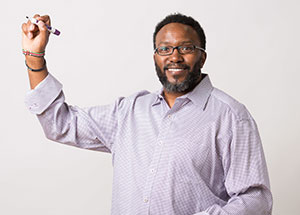Creating a Beautiful Future
An interview with Dr. Evans Baiya
Dr. Evans Baiya is a busy man. As the CTO for three companies, a technology and innovation consultant, and a global traveler, Evans has a constant stream of ideas and innovation flowing through his brain. But he wouldn’t have it any other way.
“I have always worked on more than one thing at any given time,” he says. “In fact, I do not remember ever concentrating on one thing at a time.”
At the age of 12, Evans fell in love with science. “I dreamt of creating great products to cure people. I was fascinated by the power of drugs to heal,” he says. This innate sense of curiosity and exploration has stayed with him, and spurs his relentless drive, even today.
The Kenya, Africa native came to the U.S. after high school for university, and has built up a successful consulting practice here, although he frequently travels back to Kenya to speak and consult.
After spending just a little time with Evans, it’s easy to see why his personal mantra is “reimagine everything.”
Evans most recently applied his “reimagine” mantra to the process of innovation, co-authoring The Innovator’s Advantage: Revealing the Hidden Connection Between People and Process with Ron Price. (Aloha Publishing, now available at Amazon.com.)
We sat down with Evans to talk about what it means to create a beautiful future, why innovation is for everyone, and his process for writing The Innovator’s Advantage.
What are you most passionate about when it comes to serving your clients?
I am most passionate about creating a beautiful future through innovation, which includes identifying hindrances and opportunities, solving problems, creating value, and helping them map their resources correctly so they can attain that future. The successful development of intellectual property and producing cultures of innovation are critical measures of success for me. I want to lead every client I work with to think strategically about how and what to innovate to meet and exceed their own expectations, meet their mission and, ultimately, establish differentiation.
What made you decide to write The Innovator’s Advantage?
I was trying to answer many questions: “Why do individuals and companies get disrupted and overtaken by others? Why do companies fail to take advantage of the opportunities they have to innovate? Why do so many innovations and innovators fail? Why do so many inventors get stalled when innovating?”
What I discovered was that most innovation fails not because of the ideas or the lack of investments, but because of the PEOPLE executing it. This led me to dive deeper into this phenomenon and ask, “What about these people contributed to failed innovations?”
My co-author Ron Price and I realized that most people were doing the wrong job during the innovation process! We mapped innovation into six clear stages and found that if someone was working in the wrong stage, they were likely to hinder progress and impede superior performance at that stage.
We then developed tools to enable people and companies to identify how to best fit each individual into each stage of the innovation process, for both the individual’s and the initiative’s superior outcomes.
The book is a rich resource on how to develop the right strategy for innovation, the processes and tools to use, and how to understand the people needs at each stage of innovation.
What do you hope readers will learn from the book?
I hope the book will help people understand they can be better innovators by purposefully working in areas where they are the best fit! It is no longer about if you can innovate—everyone has the ability to innovate. It is about how you best fit into the process of innovation! We have established a clarity of what is expected from each individual at every stage, so it is obvious how and what role each person will play.
Since all of us fits in one or more of the stages, this book promotes an important message: INNOVATION IS FOR EVERYONE and YOU ARE AN INNOVATOR. You just need to place everyone in the right stage for maximum performance and outcomes.


